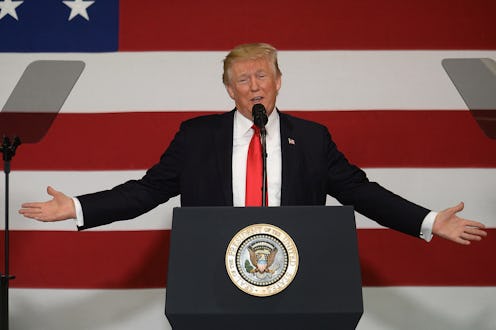News
The Sneaky Way Trump Is Trying To Sabotage Obamacare (Again)

Ever since Congress failed at following through on their promise to "repeal and replace Obamacare," President Trump, who promised the same during the 2016 election, has been threatening to "let Obamacare fail." On Thursday, he took action that looks to many like following through on that promise — and more. The Department of Health And Human Services announced that they would cut Obamacare's budget for outreach.
The planned cuts would come in two ways. The $100 million budget for advertising health insurance programs would be cut by 90 percent, and the budget for in-person assistance (such as nonprofits and health centers assisting people in signing up for the program) is going from $62.5 million in 2016 to just $36 million this year.
The cuts in Obamacare outreach could potentially lead to major problems for the normal functioning of the program. Health insurance relies on a stable "risk pool," where there is a good balance of sick people and healthy people buying insurance. Since healthy people pay premiums without needing insurance to pay for care until they get sick, their payments are able to subsidize the sick who are in the pool and cost a lot. If the balance of sick people to healthy people in the risk pool gets too skewed, it could lead to premiums skyrocketing, as the insurer tries to not hemorrhage money paying for sick people's medical bills without healthy people's premiums offsetting them.
For advocates of Obamacare, there is a fear that cutting advertising and other outreach could lead to this kind of problem, as sick people will be just as inclined to buy the insurance they need, but healthy people will be less likely to buy without the programs encouraging them.
According to an HHS official who briefed reporters, the advertising money is not necessary because “people are aware of Obamacare and the exchanges, they are aware they can sign up,” though the official was not able to point to market research backing up that point. And HHS claims that there was too much waste ongoing in in-person outreach, with many health care navigators not meeting their enrollment targets.
But research suggests that the advertising budget does have a significant impact on enrollment. A study published in Health Affairs in March found that areas with higher advertising did have boosted enrollment in the Affordable Care Act in 2013 and 2014.
The study didn't address how the enrollment changes caused by the advertising affected premiums, but health experts generally think that if cutting advertising leads to fewer healthy people enrolling, it would almost certainly lead to higher premiums.
With the federal government having spent $660 billion in 2016 on subsidies to help lower-income Americans in 2016 pay for premiums, even a minuscule rise in premiums would almost certainly cost the government vastly more than the $116.5 million it's trying to save by cutting the outreach programs.
Health and Human Services claims that its budget cuts aren't meant to follow through on the president's desire to "let Obamacare implode," but if Obamacare premiums really do go higher because of cutting advertising, it will really look like the president is sabotaging the program he can't actually get rid of — and, potentially, the health care of millions.